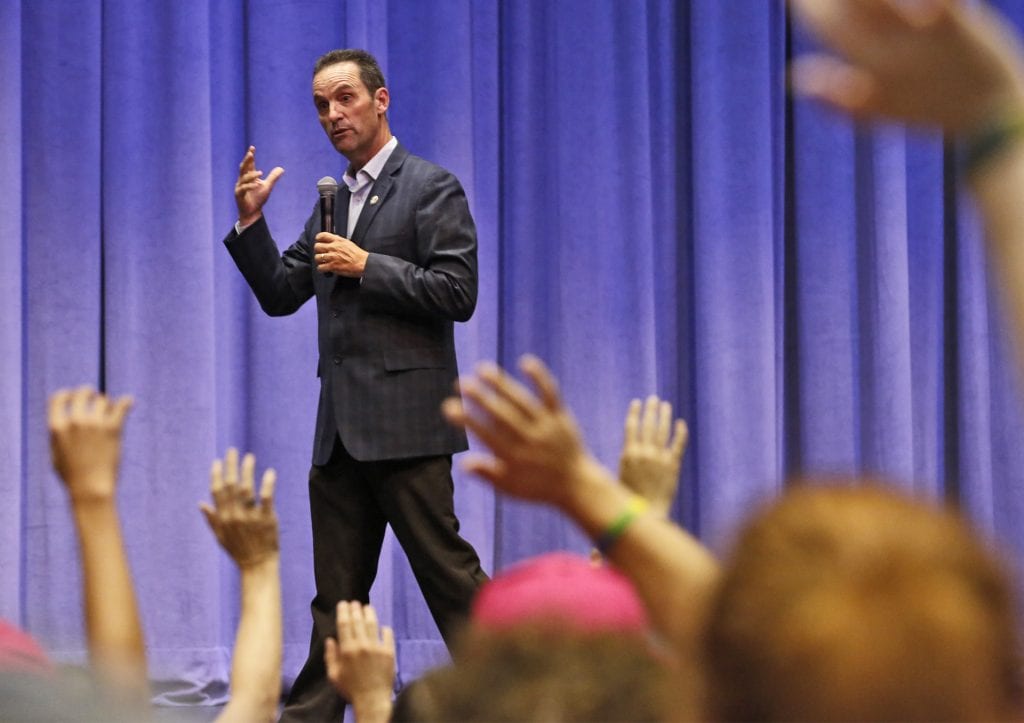The House of Representatives passed tax reform legislation 227-205 on Thursday, with Congressman Steve Knight, R-Palmdale, voting in favor.
The vote passed largely along party lines, with the exception of 13 GOP members of Congress who opposed the bill.
Knight supported the bill, while several other congressional Republicans from California were among those who broke partisan ranks and opposed the tax reform effort.
Knight’s reasoning behind the support for the measure was that it would create a “level playing field” for business and remove “special interest loopholes” in American tax code.
The opposition from other California House GOP representatives included concern the bill “will not provide the same tax relief to Californians as it does to the rest of the nation,” which was mentioned in a statement by Congressman Darrell Issa, R-San Diego, who opposed the measure.
Knight’s statement indicated that simplifying the “over-burdensome” federal tax code was the higher priority.
“For many years now, Americans have been promised relief from our over-burdensome and complicated maze of a tax code,” Knight wrote. “This is why I voted in support of H.R. 1, the Tax Cuts and Jobs Act. This bill significantly removes many of the special interest loopholes, lowers the federal income tax rates of low and middle-income families and puts businesses on a level playing field to invest in American workers and create more opportunity. Almost all analysis of this bill shows that it will create strong and consistent economic growth that dwarfs the stagnant rate of the last several years. This means more jobs and greater economic freedom for every American.”
Knight’s Democratic Party challengers for the 2018 primary jumped on the vote and released a series of statements condemning the move.
Bryan Caforio, who was Knight’s opponent in the 2016 election, said the incumbent’s vote was not what constituents wanted.
“Yet again Steve Knight’s priorities are wildly out of touch with our community,” Caforio said in a statement. “Middle-class families in our community can’t afford this tax hike, but Congressman Knight just sold us out so he could give a huge tax break to billionaires and corporate special interests.”
Katie Hill, who gained momentum by nearly matching Caforio’s fundraising efforts in the last quarter, challenged Knight’s tax reform approach and wrote on social media, noting as several others have, that both sides expect the bill to change when the Senate takes up the legislation.
“The majority of residents of the 25th district will pay higher taxes if Paul Ryan’s ‘plan’ is signed into law,” Hill posted on social media. “Steve Knight, who was elected to represent his constituents, voted against our interests to give tax cuts to corporations and wealthy campaign donors. We need a member of Congress that will stand up for the people of the 25th district, not corporations. This bill is an assault on the middle and working classes. Call your senators today and make your voices heard.”
See how representatives voted
Tax Cuts and Jobs Act
This bill amends the Internal Revenue Code to reduce tax rates and modify policies, credits, and deductions for individuals and businesses.
With respect to individuals, the bill:
- replaces the seven existing tax brackets (10%, 15%, 25%, 28%, 33%, 35%, and 39.6%) with four brackets (12%, 25%, 35%, and 39.6%),
- limits the mortgage interest deduction for debt incurred after November 2, 2017, to mortgages of up to $500,000 (currently $1 million)
- increases the standard deduction,
- repeals the deduction for personal exemptions,
- establishes a 25% maximum rate on the business income of individuals,
- increases the child tax credit and establishes a new family tax credit,
- repeals the overall limitation on certain itemized deductions,
- repeals the deduction for state and local income or sales taxes not paid or accrued in a trade or business,
- repeals the deduction for medical expenses,
- consolidates and repeals several education-related deductions and credits,
- repeals the alternative minimum tax and
- repeals the estate and generation-skipping transfer taxes in six years.
For businesses, the bill:
- reduces the corporate tax rate from a maximum of 35% to a flat 20% rate (25% for personal services corporations),
- allows increased expensing of the costs of certain property,
- limits the deductibility of net interest expenses to 30% of the business’s adjusted taxable income,
- repeals the work opportunity tax credit,
- terminates the exclusion for interest on private activity bonds,
- modifies or repeals various energy-related deductions and credits,
- modifies the taxation of foreign income and
- imposes an excise tax on certain payments from domestic corporations to related foreign corporations.
The bill also repeals or modifies several additional credits and deductions for individuals and businesses.
SOURCE: Congress.gov








